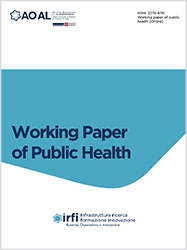Monitoring of toxicity complications in patients undergoing CAR-T: observational, prospective study

Accepted: 6 July 2022
All claims expressed in this article are solely those of the authors and do not necessarily represent those of their affiliated organizations, or those of the publisher, the editors and the reviewers. Any product that may be evaluated in this article or claim that may be made by its manufacturer is not guaranteed or endorsed by the publisher.
Background: CAR-T therapies are still a new field and toxicity management is in its early stages; targeted research addressing critical issues related to patient outcomes is therefore needed. The study aims to monitor the incidence of toxicity complications due to CAR-T during the period related to hospitalization. Methods: Observational, prospective, monocentric study. The sample will consist of all patients aged ≥18 years who are candidates for treatment with CAR-T from April 2022 to April 2025. The following rating scales will be used for data collection: Numeric Rating Scale for Pain, Adverse Events Sheet, Immune Effector Cell-associated Encephalopathy Score, Grading WHO, EuroQol-5D-3L, Hospital Anxiety Scale, Scored Patient-Generated Subjective Global Assessment, Contentment with Life Assessment Scale. Conclusions: Immunotherapy and CAR-T have shown promise in treating some malignancies. Still, they may be associated with different and not fully understood toxicities that can be fatal if not identified early and treated appropriately. Understanding complications could improve patient outcomes.
Culver KW, Anderson WF, Blaese RM. Lymphocyte gene therapy. Hum Gene Ther. 1991;2:107–9. DOI: https://doi.org/10.1089/hum.1991.2.2-107
Naam R. “More than human”. The New York Times [Internet]. 2005; Available at: https://www.nytimes.com/2005/07/03/books/chapters/more-than-human.html
Orlando L, Nepoti G. [Le terapie cellulari CAR-T. Competenza infermieristica, assistenza infermieristica, responsabilità multidisciplinare, terapie geniche. Bononia University Press, Bologna, Italy; 2021.] [article in Italian]
Benmebarek MR, Karches CH, Cadilha BL, et al. Killing mechanisms of chimeric antigen receptor (CAR) T cells. Int J Mol Sci. 2019;20. Available at: https://www.ncbi.nlm.nih.gov/labs/pmc/articles/PMC6470706/ DOI: https://doi.org/10.3390/ijms20061283
Wilkins O, Keeler AM, Flotte TR. CAR T-cell therapy: progress and prospects. Hum Gene Ther Methods. 2017;28:61. Available at: https://www.ncbi.nlm.nih.gov/labs/pmc/articles/PMC5429042/ DOI: https://doi.org/10.1089/hgtb.2016.153
Al-Mansour M, Al-Foheidi M, Ibrahim E. Efficacy and safety of second-generation CAR T-cell therapy in diffuse large B-cell lymphoma: A meta-analysis. Mol Clin Oncol. 2020;13. Available at: https://www.ncbi.nlm.nih.gov/labs/pmc/articles/PMC7416618/ DOI: https://doi.org/10.3892/mco.2020.2103
Brudno JN, Kochenderfer JN. Toxicities of chimeric antigen receptor T cells: recognition and management. Blood. 2016;127:3321–30. DOI: https://doi.org/10.1182/blood-2016-04-703751
Perales MA, Kebriaei P, Kean LS, Sadelain M. Building a safer and faster CAR: seatbelts, airbags, and CRISPR. Biol Blood Marrow Transplant. 2018;24:27–31. Available at: https://www.sciencedirect.com/science/article/pii/S1083879117307760 DOI: https://doi.org/10.1016/j.bbmt.2017.10.017
Yáñez L, Sánchez-Escamilla M, Perales MA. CAR T cell toxicity: current management and future directions. HemaSphere. 2019;3. Available at: https://www.ncbi.nlm.nih.gov/labs/pmc/articles/PMC6746032/ DOI: https://doi.org/10.1097/HS9.0000000000000186
Anderson K, Latchford T. Associated toxicities: assessment and management related to CAR T-cell therapy. 2019;13–9. Available at: https://cjon.ons.org/cjon/23/2/supplement/associated-toxicities-assessment-and-management-related-car-t-cell-therapy
Rubin DB, Danish HH, Ali AB, et al. Neurological toxicities associated with chimeric antigen receptor T-cell therapy. Brain. 2019;142:1334–48. DOI: https://doi.org/10.1093/brain/awz053
Yakoub-Agha I, Chabannon C, Bader P, et al. Management of adults and children undergoing chimeric antigen receptor T-cell therapy: best practice recommendations of the European Society for Blood and Marrow Transplantation (EBMT) and the Joint Accreditation Committee of ISCT and EBMT (JACIE). Haematologica. 2020:297–316. Available at: https://haematologica.org/article/view/9515 DOI: https://doi.org/10.3324/haematol.2019.229781
Di Maio M, Basch E, Bryce J, Perrone F. Patient-reported outcomes in the evaluation of toxicity of anticancer treatments. Nat Rev Clin Oncol. 2016:319–25. Available at: https://www.nature.com/articles/nrclinonc.2015.222 DOI: https://doi.org/10.1038/nrclinonc.2015.222
Pidala J, Kurland B, Chai X, et al. Patient-reported quality of life is associated with severity of chronic graft-versus-host disease as measured by NIH criteria: report on baseline data from the Chronic GVHD Consortium. Blood. 2011;117:4651–7. Available at: https://www.sciencedirect.com/science/article/pii/S000649712045219X DOI: https://doi.org/10.1182/blood-2010-11-319509
Basch E. New frontiers in patient-reported outcomes: adverse event reporting, comparative effectiveness, and quality assessment. Annu Rev Med. 2014;65:307–17. DOI: https://doi.org/10.1146/annurev-med-010713-141500
Jensen RE, Potosky AL, Moinpour CM, et al. United States population-based estimates of patient-reported outcomes measurement information system symptom and functional status reference values for individuals with cancer. J Clin Oncol. 2017;35:1913. Available at: https://www.ncbi.nlm.nih.gov/labs/pmc/articles/PMC5466008/ DOI: https://doi.org/10.1200/JCO.2016.71.4410
Malhotra J, Jabbour SK. Patient-related outcomes with the use of checkpoint inhibitors for the treatment of metastatic non-small cell lung cancer. Transl Lung Cancer Res. 2018;7:S138. Available at: https://www.ncbi.nlm.nih.gov/labs/pmc/articles/PMC5943224/ DOI: https://doi.org/10.21037/tlcr.2018.03.09
Chakraborty R, Sidana S, Shah GL, et al. Patient-reported outcomes with chimeric antigen receptor T cell therapy: challenges and opportunities. Biol Blood Marrow Transplant. 2019;25:e155–62. Available at: https://www.sciencedirect.com/science/article/pii/S1083879118307584 DOI: https://doi.org/10.1016/j.bbmt.2018.11.025
Huskisson EC. Measurement of pain. The Lancet. 1974;304:1127–31. Available at: https://www.thelancet.com/journals/lancet/article/PIIS0140-6736(74)90884-8/fulltext DOI: https://doi.org/10.1016/S0140-6736(74)90884-8
Attinà G, Romano A, Maurizi P, et al. Management of oral mucositis in children with malignant solid tumors. Front Oncol. 2021;11. Available at https://www.frontiersin.org/article/10.3389/fonc.2021.599243 DOI: https://doi.org/10.3389/fonc.2021.599243
Balestroni G, Bertolotti G. EuroQol-5D (EQ-5D): an instrument for measuring quality of life. Monaldi Arch Chest Dis Arch Monaldi Mal Torace. 2012;78:155–9. DOI: https://doi.org/10.4081/monaldi.2012.121
Zigmond AS, Snaith RP. The hospital anxiety and depression scale. Acta Psychiatr Scand. 1983;67:361–70. DOI: https://doi.org/10.1111/j.1600-0447.1983.tb09716.x
Ottery FD, Isenring E, Kasenic S, et al. Patient-generated subjective global assessment. 2015; Available at: https://hbo-kennisbank.nl/details/hanzepure:oai:research.hanze.nl:publications%2F0c0b0d3f-ac4c-48c8-85f2-1b029086523d
Priestman TJ, Baum M. Evaluation of quality of life in patients receiving treatment for advanced breast cancer. Lancet Lond Engl. 1976;1:899–900. DOI: https://doi.org/10.1016/S0140-6736(76)92112-7
Supporting Agencies
NoneCopyright (c) 2022 Francesca Palmisano, Roberta Di Matteo, Chiara Cannici, Martina Milioto, Martina Riccomagno, Rosanna Gaino, Ignazio Favata, Paolo Rivela, Simona Arcidiacono, Lorella Gambarini, Tatiana Bolgeo, Antonio Maconi

This work is licensed under a Creative Commons Attribution-NonCommercial 4.0 International License.
PAGEPress has chosen to apply the Creative Commons Attribution NonCommercial 4.0 International License (CC BY-NC 4.0) to all manuscripts to be published.

 https://doi.org/10.4081/wpph.2022.9543
https://doi.org/10.4081/wpph.2022.9543




